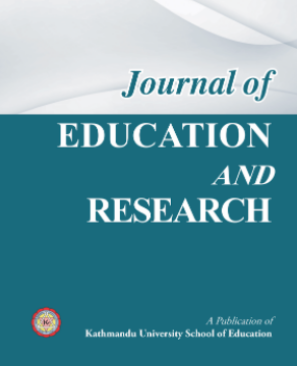
Academia-Policy Linkages: Bringing Evidence Into Policymaking Processes
Editorial
Journal of Education and Research, Volume 12, Issue 2, 2022, 1-14, https://doi.org/10.51474/jer.v12i2.620
Publication date: Sep 30, 2022
Views: 601 | Downloads: 305
How to cite this article
APA
In-text citation: (Dhakal, 2022)
Reference: Dhakal, R. K. (2022). Academia-Policy Linkages: Bringing Evidence Into Policymaking Processes. Journal of Education and Research, 12(2), 1-14. https://doi.org/10.51474/jer.v12i2.620
Reference: Dhakal, R. K. (2022). Academia-Policy Linkages: Bringing Evidence Into Policymaking Processes. Journal of Education and Research, 12(2), 1-14. https://doi.org/10.51474/jer.v12i2.620
Vancouver
In-text citation: (1), (2), (3), etc.
Reference: Dhakal RK. Academia-Policy Linkages: Bringing Evidence Into Policymaking Processes. Journal of Education and Research. 2022;12(2):1-14. https://doi.org/10.51474/jer.v12i2.620
Reference: Dhakal RK. Academia-Policy Linkages: Bringing Evidence Into Policymaking Processes. Journal of Education and Research. 2022;12(2):1-14. https://doi.org/10.51474/jer.v12i2.620
AMA
In-text citation: (1), (2), (3), etc.
Reference: Dhakal RK. Academia-Policy Linkages: Bringing Evidence Into Policymaking Processes. Journal of Education and Research. 2022;12(2), 1-14. https://doi.org/10.51474/jer.v12i2.620
Reference: Dhakal RK. Academia-Policy Linkages: Bringing Evidence Into Policymaking Processes. Journal of Education and Research. 2022;12(2), 1-14. https://doi.org/10.51474/jer.v12i2.620
Chicago
In-text citation: (Dhakal, 2022)
Reference: Dhakal, Rebat Kumar. "Academia-Policy Linkages: Bringing Evidence Into Policymaking Processes". Journal of Education and Research 2022 12 no. 2 (2022): 1-14. https://doi.org/10.51474/jer.v12i2.620
Reference: Dhakal, Rebat Kumar. "Academia-Policy Linkages: Bringing Evidence Into Policymaking Processes". Journal of Education and Research 2022 12 no. 2 (2022): 1-14. https://doi.org/10.51474/jer.v12i2.620
Harvard
In-text citation: (Dhakal, 2022)
Reference: Dhakal, R. K. (2022). Academia-Policy Linkages: Bringing Evidence Into Policymaking Processes. Journal of Education and Research, 12(2), pp. 1-14. https://doi.org/10.51474/jer.v12i2.620
Reference: Dhakal, R. K. (2022). Academia-Policy Linkages: Bringing Evidence Into Policymaking Processes. Journal of Education and Research, 12(2), pp. 1-14. https://doi.org/10.51474/jer.v12i2.620
MLA
In-text citation: (Dhakal, 2022)
Reference: Dhakal, Rebat Kumar "Academia-Policy Linkages: Bringing Evidence Into Policymaking Processes". Journal of Education and Research, vol. 12, no. 2, 2022, pp. 1-14. https://doi.org/10.51474/jer.v12i2.620
Reference: Dhakal, Rebat Kumar "Academia-Policy Linkages: Bringing Evidence Into Policymaking Processes". Journal of Education and Research, vol. 12, no. 2, 2022, pp. 1-14. https://doi.org/10.51474/jer.v12i2.620
ABSTRACT
The role of higher education and research institutions is, in principle, very crucial to inform the public policymaking processes and the policies themselves. A growing body of literature underscores the rationale for using university-produced data, evidence or research findings and implications while formulating national policies. In recent times, there has been mounting global interest in making use of research evidence while making public policies (Boswell & Smith, 2017; Glied et al., 2018; Newman et al., 2016). However, whether policymaking bodies ever try to use such evidence while formulating national policies or the universities make a systematic attempt to inform policymakers of the recent and relevant research has been questionable in the South Asian context. Some scholars also critique that academic research though submerged in “scientific and methodological rigour is generally found to be of little relevance to practice” (Panda & Gupta, 2014, p. 156). My experience of working in academia and with government informs that research is only one [small one, not capital ONE] of many things that influence the public policymaking in Nepal. In fact, policymaking is not a linear, rational process and thus local values, cultures and ideologies are equally important (Dhakal, 2019a; Parajuli, 2015). So I am inclined to use the term ‘evidence-informed’ policy (Bowen & Zwi, 2005; Centre for Public Impact, 2018; Head, 2015) rather than ‘evidence-based policy’ (Nutley et al., 2007; Newman et al., 2016) in the Nepali public policymaking context. I assume the basics of the making of public policy in developing countries to be somehow similar. The national policymaking structures are government bodies (state agencies) and the processes mostly include the interaction between the politicians, bureaucrats, and a few experts or interest groups. Ironically, the expert meetings are often limited to exploring opinions and limited experiences of the experts, rather than engaging in data/evidence-based discussion (Dhakal, 2017). As such, rather than being based on or informed by extant research evidence, the processes in Nepal are often driven by (political and bureaucratic) interests (Dhakal, 2019b; Jones, 2010; Gelal, 2015; Pokharel, 2015). Moreover, in recent years, the policymaking domain in Nepal has expanded to include non-state actors such as international/donor agencies, INGOs, and pressure groups (Gelal, 2015). These inform us that a careful re-examination of the policymaking processes in Nepal is necessary. Against the above backdrop, this piece of writing highlights the role of higher education institutions in influencing the evidence-informed policy-making in Nepal. Moreover, it also attempts to envisage ways to influencing policymaking structures and processes through research evidence in Nepal.
KEYWORDS
---
REFERENCES
---
LICENSE
This work is licensed under a Creative Commons Attribution 4.0 International License.
